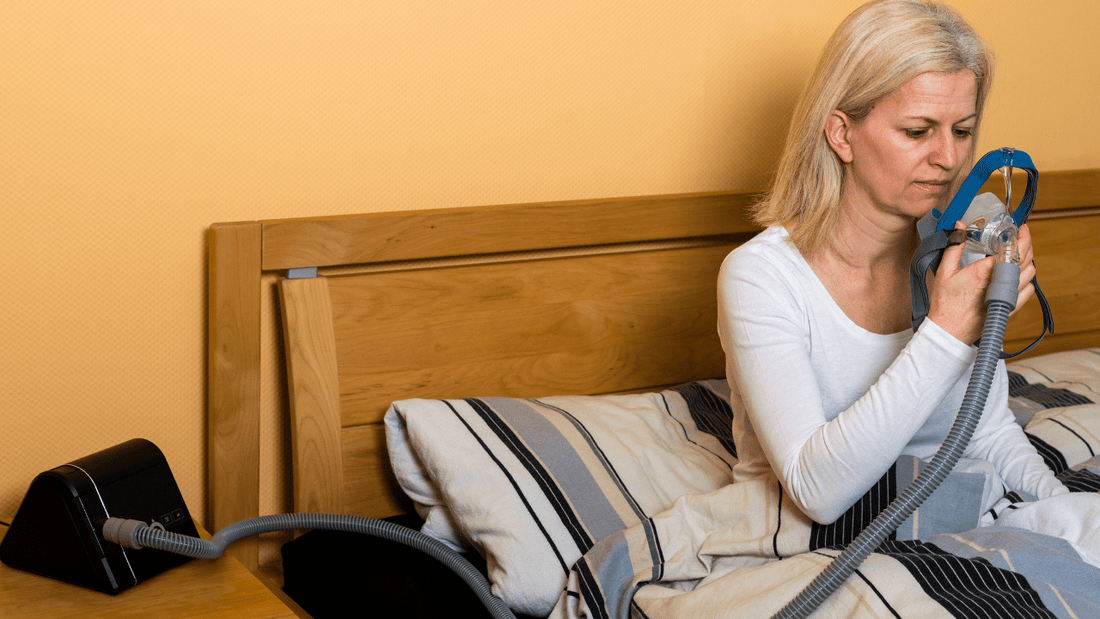
How Long to Get Used to CPAP? A Guide to Adjusting and Feeling the Benefits
For anyone newly diagnosed with obstructive sleep apnoea (OSA), the introduction of a CPAP machine (Continuous Positive Airway Pressure) can feel both overwhelming and hopeful. You’ve likely heard about the life-changing benefits of CPAP therapy for better sleep and overall health. But like any adjustment, it’s natural to wonder, how long to get used to CPAP?
In this blog, we’ll explore how long it typically takes to adapt to CPAP therapy, what factors influence the timeline, and what you can do to speed up the process. We’ll also discuss the CPAP benefits timeline and answer questions like, how long does it take to feel rested after starting CPAP? Or how long after starting CPAP do you feel better?
How Long Does It Take to Get Used to a CPAP Machine?
For most people, the process of adapting to CPAP therapy takes anywhere from a few days to a few weeks. Some users might feel comfortable with their sleep apnea machine almost immediately, while others may need a couple of months to fully adjust. On average, it’s reasonable to expect that the length of time it takes to get used to CPAP varies depending on individual factors such as sleep habits, severity of OSA, and mask comfort.
Factors That Impact Adjustment Time:
-
Mask Fit and Comfort: The CPAP mask is a crucial element in ensuring effective therapy. A poorly fitting mask can cause discomfort and make it harder to adjust. Take the time to explore different mask options, including nasal masks and full-face masks, to find what works best for you.
-
Pressure Settings: It might take a while to get used to the air pressure delivered by the breathing machine. Some users benefit from machines with ramp features that gradually increase pressure to ease them into therapy.
-
Sleep Patterns: If you’re someone who has irregular sleep habits, adjusting to wearing a sleep apnea machine every night can take longer.
-
Mindset and Consistency: Approaching CPAP therapy with a positive attitude and sticking to it every night will significantly reduce how long it takes to adapt.
How Long for CPAP to Work?
Another common question is, how long does CPAP take to work? The answer depends on what you’re looking to achieve with the therapy.
Short-Term Improvements:
Some people notice immediate changes, such as reduced snoring and fewer awakenings during the night, within just a few days of using CPAP. While the adjustment period can take weeks, these early signs indicate that the therapy is working.
Long-Term Benefits:
For others, it might take several weeks to months to fully experience the benefits of CPAP therapy. How long does it take to feel rested after starting CPAP? This often depends on how severe your OSA was before treatment. The CPAP benefits timeline typically looks like this:
-
Week 1: Initial improvements in snoring and breathing interruptions.
-
Weeks 2-4: Enhanced sleep quality and reduced fatigue during the day.
-
Months 2-3: Long-term health benefits like improved heart health, mental clarity, and energy levels.
A major factor in how long for CPAP benefits to manifest is whether you’re using the device correctly. It’s important to monitor your progress and check in with your healthcare provider if you’re not seeing results. Sometimes, adjustments in pressure settings or switching to a different mask style can make all the difference.
How Many Hours Per Night Should I Use My CPAP Machine?
To get the most out of your therapy, you should aim to use your sleep apnea machine for at least 4-6 hours per night. However, the average hours of sleep using CPAP machine among users who adjust well is closer to 7-8 hours. The more consistent you are with wearing your CPAP, the sooner you’ll notice the benefits.
Does CPAP Make You Feel Better?
Absolutely. Once you’ve adjusted to wearing the continuous positive airway pressure machine, you’ll likely experience a range of benefits, including:
-
Reduced daytime sleepiness
-
Fewer headaches in the morning
-
Improved focus and concentration
-
Better mood and emotional stability
-
Enhanced overall quality of life
Tips for Adjusting to CPAP Therapy
If you’re struggling with how long does it take to get used to using a CPAP machine, here are some strategies to help:
-
Start Slow: If wearing the mask all night feels overwhelming, try using it for short periods while watching TV or relaxing during the day.
-
Invest in Comfort: Ensure your CPAP supplies are tailored to your needs. A well-fitting mask and high-quality equipment, such as a ResMed CPAP machine, can significantly enhance your experience.
-
Address Discomfort: Don’t hesitate to reach out to your provider if you experience dryness, air leaks, or pressure discomfort. Adding a humidifier or adjusting the settings can help.
-
Stick to a Routine: Consistency is key. Use your apnea machine every night, even if it feels challenging at first.
-
Be Patient: Remember, everyone’s adjustment timeline is different. Give yourself time to adapt.
Conclusion
Adapting to a CPAP machine can feel daunting at first, but the benefits far outweigh the challenges. While the question of how long to get used to CPAP depends on individual factors, most people find that within a few weeks of consistent use, they start to feel better. By sticking with the therapy, addressing any issues promptly, and using high-quality equipment, you can significantly improve your sleep and overall health. Remember, patience and persistence are your greatest allies in making CPAP therapy a success.
